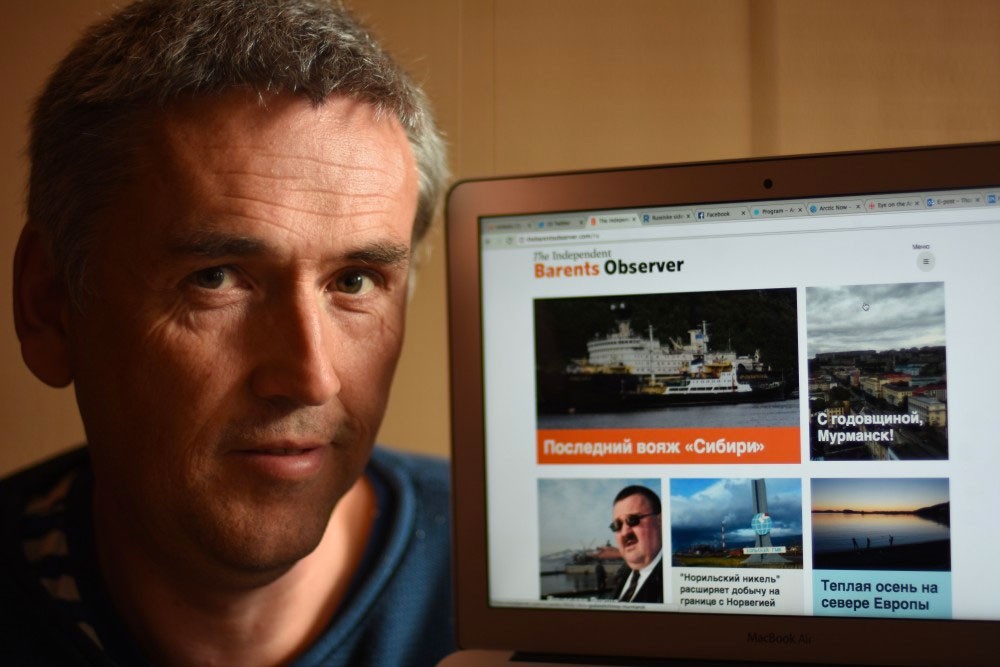In a chilling broadside against the independent press, Moscow has blocked further publication of the Barents Observer, a Norwegian news portal published in Russian and English, on the Russian Internet.
In a chilling broadside against the independent press, Moscow has blocked further publication of the Barents Observer, a Norwegian news portal published in Russian and English, on the Russian Internet.
The move comes just days after Russian lawmakers backed a bill aimed at isolating the country’s Internet from the rest of the world with the apparent goal of bolstering Moscow’s cyber defenses.
But the news portal’s publishers, as well as rhetoric from Russian lawmakers, suggest Moscow’s targeting of the Barents Observer’s online Russian-language presence was more personal.
For years, the portal has produced reporting on social and environmental issues concerning residents of Northern Norway and their Russian counterparts just across the border. And while the portal has sought to foster political and economic cooperation in the Barents Sea region, it has also been independent and unsparing in its criticism of officials in Russia and Norway alike.
The ban of the publication via the Russian-controlled Internet came earlier this week after it ran a January story about a Swedish gay activist who traced his routes to the Sami people, an indigenous group inhabiting Northwest Russia and Scandinavia.
The article brought a firestorm of shrill criticism from lawmakers in Moscow, which in 2013 criminalized the publication of materials seen by the government as friendly to so-called non-traditional sexual lifestyles.
Roskomnazdor, Russia’s federal communications authority, fired off a letter to the Barents Observer demanding it remove the article on the Swedish activist from its site or face being blocked – which the portal’s editor, Thomas Nilsen, refused to do.
In the days following, Vitaly Limonov, a member of the Foreign Affairs Committee in Russia’s deeply conservative parliament, told the Russian Federal News Service that the Barents Observer represented “degeneration and decay,” and demanded the portal be “blocked to hell” on the Russian Internet.
By Tuesday morning, the ban of the portal on Russian territory seemed to have taken effect. Nilsen, who used to work with Bellona, reported that visits to the Barents Observer’s site from Russia had fallen off almost completely, and that it was now only accessible to readers using virtual private networks that allow them to bypass restrictions.
Nilsen says he refuses to remove the story that so offended the sensibilities of Russian officialdom.
“Roskomnadzor or any other authority be it in Russia or Norway has absolutely no influence on our editorial freedom,” he said. “It is out of question to un-publish the article.”
“With the dramatic changes we see in the Arctic in regards to climate and nature, it is more important than ever to have newspapers up north that independently can report from the region,” he added. “Yes, there are cultural and linguistic differences between the countries that are play a roll in security, society, ecology and businesses in the Arctic, and a very good way to avoid misunderstandings and conflicts is to support cross-border bilingual newspapers like the Barents Observer. What Roskomnadzor is accomplishing by censoring the entire Barents Observer from our readers in Russia is the opposite and is not good for the high north, and it is not good for Russia itself either.”
Ironically, the heavy-handed block of the portal has received generous coverage by some of the Russian media’s biggest player. The business daily Vedomosti, the independent Novaya Gazeta, the official newswire Interfax and the internet television broadcaster TV Rain all carried reports on Roskomnazor’s censorship of the site.
And while Russian authorities have long been antagonistic to the Barents Observer, the block on its site in Russia represents Moscow’s most explicit attempt yet to muzzle the publication.
In March of 2017, Nilsen was received notice from authorities that he was banned from travelling in Russia, after the Federal Security Service, or FSB, designated him as a “security risk.” He sued to have his visa reinstated, but was not allowed into Russia to defend himself in court.
Though, clearly, that would have made no difference: Russian prosecutors refused tell his Moscow-based lawyers the basis for his designation as a security risk – saying that the reasons behind the FSB decision were classified.
The portal routinely writes on pollution emanating from Russian industry on the Kola Peninsula, Arctic oil exploration, Moscow’s pursuit of so-called “foreign agent” civil society groups, as well as the ongoing saga of nuclear waste produced by the Russian Navy’s Northern Fleet.
Still, officialdom on both sides of the border has attempted to squelch the portal, at one point making it the focus of a backstairs flap between Norwegian government and the FSB. At that time, Norwegian officials overseeing the paper had pressured Nilsen and his staff to dull their editorial edge.
But Nilsen refused. He and his staff left the paper, later reopening it and placing its ownership in the hands of its journalists. It was later suggested by a report on Norway’s NRK national broadcaster that the FSB had been pressuring the Norwegian officials responsible for overseeing the paper, though Nilsen himself was unable to corroborate that.
During Nilsen’s tenure with Bellona,he was deeply involved in the defense of Alexander Nikitin, the Bellona expert from Russia who in 1995 was charged with treason for his contributions to the organization’s report on radioactive waste handling in the Russian Navy.
Russia’s Supreme Court acquitted Nikitin in 2000, but Nilsen and other Bellona staff who co-authored the report were targeted with visa rejections while they worked on Nikitin’s defense in 1996.




